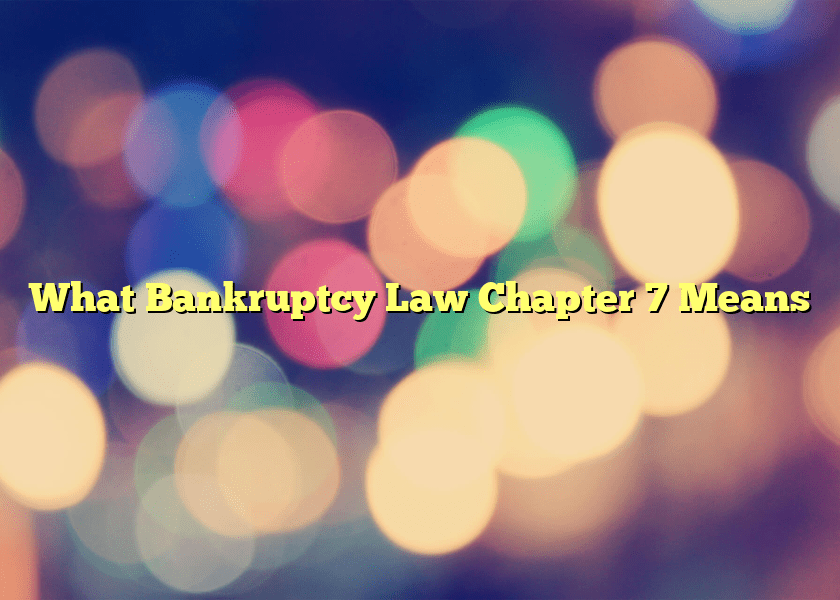What Bankruptcy Law Chapter 7 Means
Bankruptcy Law Chapter 7 refers to the process of liquidation of a debtor’s assets in order to pay debt. A bankruptcy trustee will handle your case and he will be responsible to liquidate or sell your assets that are non-exempt and distribute the proceeds among your creditors.
One thing about Bankruptcy Law Chapter 7 is most people who qualify under it have few or no valuable assets that can be liquidated. For instance, if the equity or resale value of the house, any real estate property or a car is very little, then the owners can keep it. .
Whether or not you have assets that are worth liquidating, most of your unsecured type of debt may be erased or discharged through Bankruptcy Law Chapter 7. This may include credit cards, medical bills and personal loans. However, not all your financial obligations can be discharged such as student loans, family support and criminal fines.
An individual, married couple or a business organization can file under a Bankruptcy Law Chapter 7. The criteria for eligibility are:
* You have not received a Chapter 7 discharge in the last 8 years
* You have not received a Chapter 13 discharge in the last 6 years
* You do not have a Chapter 7 petition dismissed within the last 180 days
* You have not attempted to deceive your creditors or the bankruptcy court.
* Your income is equal or below the median income in your state. You will be required to take the means test to determine your income and eligibility.
If you are qualified to file under Bankruptcy Law Chapter 7, the first thing you are required to do is to complete a credit counseling session with an agency certified by the United States Trustee.
After counseling comes the paperwork. You will need to fill out official bankruptcy forms and prepare other documents required for filing under Bankruptcy Law Chapter 7 such as a detailed statement of your income and expense statements, a list of your assets and liabilities, current tax returns and a copy of your credit counseling certificate.
Once you have filed your petition at your local bankruptcy court, you can expect two things to happen:
First, a feature of the Bankruptcy Law Chapter 7 called the ‘automatic stay’ takes effect prohibiting wage garnishment, foreclosure, car repossession, and lawsuits from creditors. The law also prevents most of your creditors from calling you or sending you bills to collect payment. You can refer your creditors to your lawyer, if you have one.
Second, you will have to go to court to attend what is called the First Meeting of Creditors or 341 Meeting. Usually, this is scheduled within 30 to 40 days after filing. During this short meeting, you will be under oath and the trustee will be questioning you to find out if all information you have provided the court is complete and accurate.
Normally after 60 to 75 days following this meeting the bankruptcy court will issue the discharge. The whole process of filing for Bankruptcy Law Chapter 7 may take from 4 to 6 months and the fee costs $299.
Bankruptcy filing can be a complicated process. So, while you can do it by yourself, you may want to get a lawyer who specializes in bankruptcy law to assist you in filing and give you legal advice. Lawyer’s fees vary from $600 up to $1200.
Whether you filed for Bankruptcy Law Chapter 7 or any other chapter in the bankruptcy code, there will be a record of it on your credit report for 10 years and it may take several years before you can re-establish your credit. So think hard and do your research to be certain if Bankruptcy Law Chapter 7 is what you really need.
